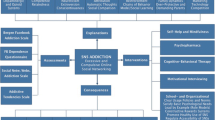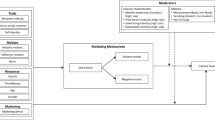Abstract
The present study aimed to explore how food or substance consumption (e.g., experiencing hunger, or having consumed alcohol or recreational drugs) could shape consumer impulsive spending on sports betting products. Based on a large online sample of Australian sports bettors, we found that participants with higher hunger level, or having consumed more alcohol or recreational drugs, tended to have increased impulsive bet size. These impulsiveness effects had both direct and indirect effect components. The significant direct effects confirmed that positive relationships directly existed between hunger, alcohol consumption, or recreational drug consumption and impulsive bet size, even when all potential mediators and covariates were statistically controlled. Moreover, results regarding specific indirect effects demonstrated that hunger, alcohol consumption, or recreational drug consumption was also indirectly linked with impulsive bet size, via their relationships with both promotional and financial influences, rather than social influences. Furthermore, participants’ Problem Gambling Severity Index score was positively associated with their impulsive bet size. These findings support and complement the literature on impulsivity as well as the research on strategies for staying in control of gambling, and have implications for consumers, regulators, and treatment/help providers.


Similar content being viewed by others
References
Adams, R. C., Lawrence, N. S., Verbruggen, F., & Chambers, C. D. (2017). Training response inhibition to reduce food consumption: Mechanisms, stimulus specificity and appropriate training protocols. Appetite,109, 11–23.
AFP. (2015). Global sports gambling worth ‘up to $3 trillion’. Retrieved from https://www.dailymail.co.uk/wires/afp/article-3040540/Global-sports-gambling-worth-3-trillion.html.
Allen, C., & Nettle, D. (2019). Hunger and socioeconomic background additively predict impulsivity in humans. Current Psychology. https://doi.org/10.1007/s12144-019-0141-7.
Amos, C., Holmes, G. R., & Keneson, W. C. (2014). A meta-analysis of consumer impulse buying. Journal of Retailing and Consumer Services,21(2), 86–97.
Badgaiyan, A. J., & Verma, A. (2015). Does urge to buy impulsively differ from impulsive buying behaviour? Assessing the impact of situational factors. Journal of Retailing and Consumer Services,22, 145–157.
Baumeister, R. F. (2018). Self-regulation and self-control: Selected works of Roy F. Baumeister. Routledge.
Beatty, S. E., & Ferrell, M. E. (1998). Impulse buying: Modeling its precursors. Journal of Retailing,74(2), 169–191.
Browne, M., Langham, E., Rockloff, M. J., Li, E., Donaldson, P., & Goodwin, B. (2015). EGM jackpots and player behaviour: An in-venue shadowing study. Journal of Gambling Studies,31(4), 1695–1714.
Bryan, C. J., Garland, E. L., & Rudd, M. D. (2016). From impulse to action among military personnel hospitalized for suicide risk: Alcohol consumption and the reported transition from suicidal thought to behavior. General Hospital Psychiatry,41, 13–19.
Chamberlain, S. R., Redden, S. A., & Grant, J. E. (2017). Calorie intake and gambling: Is fat and sugar consumption ‘impulsive’? Journal of Gambling Studies,33(3), 783–793.
Ciampolini, M., & Bianchi, R. (2006). Training to estimate blood glucose and to form associations with initial hunger. Nutrition & Metabolism,3, 42.
Clover, V. T. (1950). Relative importance of impulse-buying in retail stores. Journal of Marketing,15(1), 66–70.
de Wit, H. (2009). Impulsivity as a determinant and consequence of drug use: A review of underlying processes. Addiction Biology,14(1), 22–31.
Ferris, J., & Wynne, H. (2001). The Canadian Problem Gambling Index: Final report. Submitted for the Canadian Centre on Substance Abuse.
Fillmore, M. T., Rush, C. R., & Hays, L. (2002). Acute effects of oral cocaine on inhibitory control of behavior in humans. Drug and Alcohol Dependence,67(2), 157–167.
Gailliot, M. T. (2013). Hunger and reduced self-control in the laboratory and across the world: Reducing hunger as a self-control panacea. Psychology,4(1), 59–66.
Gailliot, M. T., Baumeister, R. F., DeWall, C. N., Maner, J. K., Plant, E. A., Tice, D. M., et al. (2007). Self-control relies on glucose as a limited energy source: Willpower is more than a metaphor. Journal of Personality and Social Psychology,92(2), 325–336.
Grant, J. E., & Chamberlain, S. R. (2014). Impulsive action and impulsive choice across substance and behavioral addictions: Cause or consequence? Addictive Behaviors,39(11), 1632–1639.
Hayes, A. F. (2018). Introduction to mediation, moderation, and conditional process analysis: A regression-based approach (2nd ed.). New York: Guilford.
Hing, N., Li, E., Vitartas, P., & Russell, A. M. T. (2018a). On the spur of the moment: Intrinsic predictors of impulse sports betting. Journal of Gambling Studies,34(2), 413–428.
Hing, N., Russell, A. M. T., Li, E., & Vitartas, P. (2018b). Does the uptake of wagering inducements predict impulse betting on sport? Journal of Behavioral Addictions,7(1), 146–157.
Hing, N., Sproston, K., Tran, K., & Russell, A. M. T. (2017). Gambling responsibly: Who does it and to what end? Journal of Gambling Studies,33(1), 149–165.
Honkanen, P., Olsen, S. O., Verplanken, B., & Tuu, H. H. (2012). Reflective and impulsive influences on unhealthy snacking. The moderating effects of food related self-control. Appetite,58(2), 616–622.
Ioannidis, K., Hook, R., Wickham, K., Grant, J. E., & Chamberlain, S. R. (2019). Impulsivity in Gambling Disorder and problem gambling: A meta-analysis. Neuropsychopharmacology,44(8), 1354–1361.
Johansson, A., Grant, J. E., Kim, S. W., Odlaug, B. L., & Götestam, K. G. (2009). Risk factors for problematic gambling: A critical literature review. Journal of Gambling Studies,25(1), 67–92.
Letts, S. (2018). Chart of the day: Are Australians the world’s biggest gambling losers? You can bet on it. Retrieved from https://www.abc.net.au/news/2018-11-20/australians-worlds-biggest-gambling-losers/10495566.
Manasse, S. M., Goldstein, S. P., Wyckoff, E., Forman, E. M., Juarascio, A. S., Butryn, M. L., et al. (2016). Slowing down and taking a second look: Inhibitory deficits associated with binge eating are not food-specific. Appetite,96, 555–559.
McDonald, J., Schleifer, L., Richards, J. B., & de Wit, H. (2003). Effects of THC on behavioral measures of impulsivity in humans. Neuropsychopharmacology,28(7), 1356–1365.
Meule, A., Lutz, A. P., Krawietz, V., Stützer, J., Vögele, C., & Kübler, A. (2014). Food-cue affected motor response inhibition and self-reported dieting success: A pictorial affective shifting task. Frontiers in Psychology,5, 216.
Miller, M. A., & Fillmore, M. T. (2014). Protracted impairment of impulse control under an acute dose of alcohol: A time-course analysis. Addictive Behaviors,39(11), 1589–1596.
Perry, J. L., & Carroll, M. E. (2008). The role of impulsive behavior in drug abuse. Psychopharmacology (Berl),200(1), 1–26.
Queensland Government Statistician’s Office. (2018). Australian gambling statistics (34th ed.). Queensland Treasury.
Ramaekers, J. G., Kauert, G., van Ruitenbeek, P., Theunissen, E. L., Schneider, E., & Moeller, M. R. (2006). High-potency marijuana impairs executive function and inhibitory motor control. Neuropsychopharmacology,31(10), 2296–2303.
Roberts, J. A., & Manolis, C. (2012). Cooking up a recipe for self-control: The three ingredients of self-control and its impact on impulse buying. Journal of Marketing Theory and Practice,20(2), 173–188.
Rook, D. W. (1987). The buying impulse. Journal of Consumer Research,14(2), 189–199.
Stern, H. (1962). The significance of impulse buying today. Journal of Marketing,26(2), 59–62.
Sztainert, T., Hay, R., Wohl, M. J. A., & Abizaid, A. (2018). Hungry to gamble? Ghrelin as a predictor of persistent gambling in the face of loss. Biological Psychology,139, 115–123.
Tomlinson, M. F., Brown, M., & Hoaken, P. N. S. (2016). Recreational drug use and human aggressive behavior: A comprehensive review since 2003. Aggression and Violent Behavior,27, 9–29.
Vohs, K. D., & Faber, R. J. (2007). Spent resources: Self-regulatory resource availability affects impulse buying. Journal of Consumer Research,33(4), 537–547.
Wang, Y., Zhu, J., Hu, Y., Fang, Y., Wang, G., Cui, X., et al. (2016). The effect of implicit preferences on food consumption: Moderating role of ego depletion and impulsivity. Frontiers in Psychology,7, 1699.
West, C. J. (1951). Results of two years of study into impulse buying. Journal of Marketing,15(3), 362–363.
Zhou, L., & Wong, A. (2004). Consumer impulse buying and in-store stimuli in Chinese supermarkets. Journal of International Consumer Marketing,16(2), 37–53.
Acknowledgements
This study was funded by internal funding from the Centre for Gambling Education and Research at Southern Cross University. AR was a member of this Centre at the time that the data were collected. A previous version of this paper was presented at the Australian & New Zealand Academy of Management (ANZAM) 2018 Conference. EL was a Visiting Scholar at the University of Waterloo’s Gambling Research Lab, while this manuscript was revised in preparation for journal submission. We greatly appreciate comments and suggestions from the ANZAM 2018 Conference attendees as well as members of the Waterloo Gambling Research Lab.
Author information
Authors and Affiliations
Corresponding author
Ethics declarations
Conflict of interest
En Li has received research grants from the Victorian Responsible Gambling Foundation and Gambling Research Australia. He declares that he has no conflicts of interest in relation to this manuscript. Nerilee Hing has received research funds from the Victorian Responsible Gambling Foundation, Gambling Research Australia, Australian Government Department of Social Services, Alberta Gambling Research Institute, the Australian Gambling Research Centre, the Queensland, New South Wales, Victorian and South Australian Governments, the Australian Research Council, and Australia’s National Research Organisation for Women’s Safety. She has also received consultancy funds from Echo Entertainment and Sportsbet and an honorarium from Singapore Pools for membership of its International Advisory Committee. She declares that she has no conflicts of interest in relation to this manuscript. Alex Russell has received funding from Victorian Responsible Gambling Foundation; the NSW State Government; Queensland Justice and Attorney-General; Gambling Research Australia; National Association for Gambling Studies; Australian Communications and Media Authority and the Alberta Gambling Research Institute. He has received industry funding for an evaluation of problem gambling amongst casino employees from Echo/Star Entertainment Group. He is also affiliated with the University of Sydney. He declares no conflicts of interest in relation to this manuscript. Peter Vitartas has received research funds from the Queensland Department of Justice and Attorney-General and declares no conflicts of interest in relation to this manuscript.
Ethical approval
All procedures performed in studies involving human participants were in accordance with the ethical standards of the institutional and/or national research committee and with the 1964 Helsinki declaration and its later amendments or comparable ethical standards. The research project reported in this paper was approved by the CQUniversity Human Research Ethics Committee (approval number: H16/06-163).
Additional information
Publisher's Note
Springer Nature remains neutral with regard to jurisdictional claims in published maps and institutional affiliations.
Rights and permissions
About this article
Cite this article
Li, E., Hing, N., Russell, A.M.T. et al. Impulsive Sports Betting: The Effects of Food or Substance Consumption. J Gambl Stud 36, 539–554 (2020). https://doi.org/10.1007/s10899-020-09938-1
Published:
Issue Date:
DOI: https://doi.org/10.1007/s10899-020-09938-1




